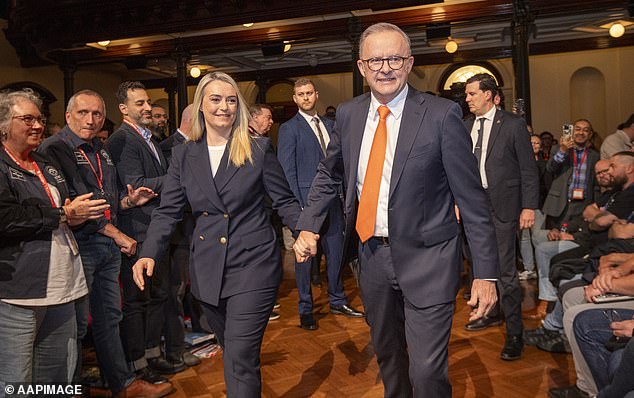Business Council of Australia boss unleashes on Anthony Albanese over Labor’s new industrial relations laws: ‘Steps backwards’
Australian businesses are coming down hard on Prime Minister Anthony Albanese, claiming his new industrial relations laws are setting the country back.
Bran Black, chief executive of the Business Council of Australia (BCA), will tell Albanese in a speech on Tuesday evening that leaders of many large companies “feel like we are losing our way economically under the Labor Party”.
“Instead of making big steps forward on the things that matter, we are taking small – but noticeable – steps back,” Mr Black will tell attendees at a dinner hosted by the lobby group, which will also be attended by Finance Minister Jim Chalmers.
“I’ve spoken to many CEOs who said they are much more cautious about hiring after the recent changes the government has made to the workplace.”
Mr Black will target Labor’s sweeping new employment relations laws, which will see the return of industry negotiations over pay and conditions. The new laws also include a controversial ‘right to disconnect’, or to ignore bosses’ after-hours phone calls.
According to Mr Black, this puts jobs at risk.
“A good job must first exist before it is well paid,” he will tell the prime minister.
‘Abolishing multi-employer negotiations should be seen as a priority in this context.
Bran Black (pictured) is the CEO of the Business Council of Australia and will tell Prime Minister Anthony Albanese that the country is taking a ‘step backwards’ under his government.
‘We need to start making agreements between employers and employees about their workplaces again as soon as possible, taking into account the fact that every company is unique. There should be no more top-down policy approaches that are the same for everyone.’
Mr Black warns that Australia is burdened by bureaucracy and that government spending and debt threaten to undermine future prosperity.
“No political party has seriously proposed anything recently that would materially change that forecast,” he will say.
‘We have already passed the opportunity for small steps, so only bold policy steps will matter.
“We’re steadily expanding regulations, rather than eliminating them, making it harder to run a business.”
The CEO will also target the Coalition over a Nationals-led effort to break up Australian businesses, such as forcing Qantas to divest budget airline Jetstar.
“We see ideas on the table to force our best performing companies to divest, despite independent evaluations showing time and again that this is the wrong way to go,” Black said.
“And we’ve seen so-called Robin Hood proposals to impose even higher taxes on our success. All of this reduces our competitiveness as a nation.
‘And the result is best illustrated by the fact that I now have members – major employers – who are now actively choosing to invest overseas rather than in Australia.’

When asked about the speech, Mr Albanese (pictured with his partner Jodie Haydon) highlighted the points his government has in common with the Business Council of Australia
Mr Black will also outline five key areas of focus for the BCA that he says the parties need to address during next year’s federal election.
Examples include the high cost of living, the housing crisis, the drive for net-zero carbon emissions, the cost of elderly care and the ongoing shortage of skilled workers.
When asked about Mr Black’s comments on Tuesday, Mr Albanese stressed that the BCA and his government have the same five priorities.
“It is good that we are on the same page on priorities,” he said.
Mr Albanese said his government had created more than a million jobs and supported higher wages, “continued growth” and a “continued increase in business investment”.
Social Services Minister Amanda Rishworth has accused business groups of “posturing” in the run-up to next year’s federal election.
She said the government was “working with business on all fronts” to increase productivity, but that fairness to workers was an important part of this.
“We have made sure that there is balance when it comes to negotiations on wages and conditions. What we have actually seen is a reduction in strikes and an increase in wages,” she told Channel Nine ahead of Black’s speech.
‘That is good for the employees, but also for the business community.’
The BCA represents many of Australia’s largest companies, including BHP, Hancock Prospecting, the big four banks and accounting firms: Wesfarmers, Coles, Woolworths, Telstra, Atlassian and Qantas.
